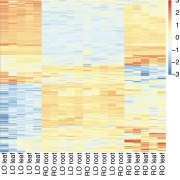On bioRxiv: Incomplete epigenetic reprogramming during asexual reproduction
Incomplete reprogramming of cell-specific epigenetic marks during asexual reproduction leads to heritable phenotypic variation in plants
Wibowo et al. bioRxiv 2018/02/19/267955
Plants differ from animals in their capability to easily regenerate fertile adult individuals from terminally differentiated cells. This unique developmental plasticity is commonly observed in nature where many species can reproduce asexually through the ectopic initiation of organogenic or embryogenic developmental programs. However, it is not currently known if this developmental reprogramming is coupled to a global epigenomic resetting, or what impact it has on the phenotype of the clonal progeny. Here we show that plants asexually propagated via induction of a zygotic developmental program do not fully reset cell-specific epigenetic imprints. These imprints are instead inherited even over multiple rounds of sexual reproduction, becoming fixed in hybrids and resulting in heritable molecular and physiological phenotypes that depend on the founder cell used. Our results demonstrate how novel phenotypic variation in plants can be unlocked through the incomplete reprogramming of cell-specific epigenetic marks during asexual propagation.




